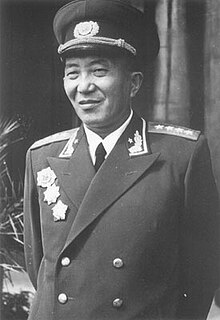
Back لو رويكينج ARZ Luo Ruiqing Catalan Luo Žuej-čching Czech Luo Ruiqing German Luo Ruiqing Finnish Luo Ruiqing French Luo Ruiqing ID Luo Ruiqing Italian 羅瑞卿 Japanese 뤄루이칭 Korean
This article includes a list of references, related reading, or external links, but its sources remain unclear because it lacks inline citations. (March 2013) |
Luo Ruiqing | |
|---|---|
 General Luo Ruiqing | |
| Nickname(s) | Luo the Tall |
| Born | May 31, 1906 Nanchong, Sichuan, China |
| Died | August 3, 1978 (aged 72) Heidelberg, West Germany |
| Allegiance | |
| Service | |
| Years of service | 1928–1966 |
| Rank | Grand General |
| Commands | Commander-in-chief of the 2nd Army Group, North China, Chief of Joint Staff |
| Battles / wars | Northern Expedition, Long March, Hundred Regiments Offensive, Chinese Civil War, Korean War, Sino-Indian War |
| Awards |
|
| Other work | Politician, Writer |
| Luo Ruiqing | |||||||||
|---|---|---|---|---|---|---|---|---|---|
| Traditional Chinese | 羅瑞卿 | ||||||||
| Simplified Chinese | 罗瑞卿 | ||||||||
| |||||||||
Luo Ruiqing (simplified Chinese: 罗瑞卿; traditional Chinese: 羅瑞卿; pinyin: Luó Ruìqīng; May 31, 1906 – August 3, 1978), formerly romanized as Lo Jui-ch'ing, was a Chinese army officer and politician, general of the People's Liberation Army. As the first Minister of Public Security from 1949 to 1959, he established the security and police apparatus of the People's Republic of China after the Communist victory in the civil war, and then served as the Chief of the Joint Staff from 1959 to 1965, achieving military victory in the Sino-Indian War.
Despite being a close associate and supporter of Mao Zedong for decades, Luo was targeted, purged, and severely beaten during the Cultural Revolution, which he opposed from the beginning.